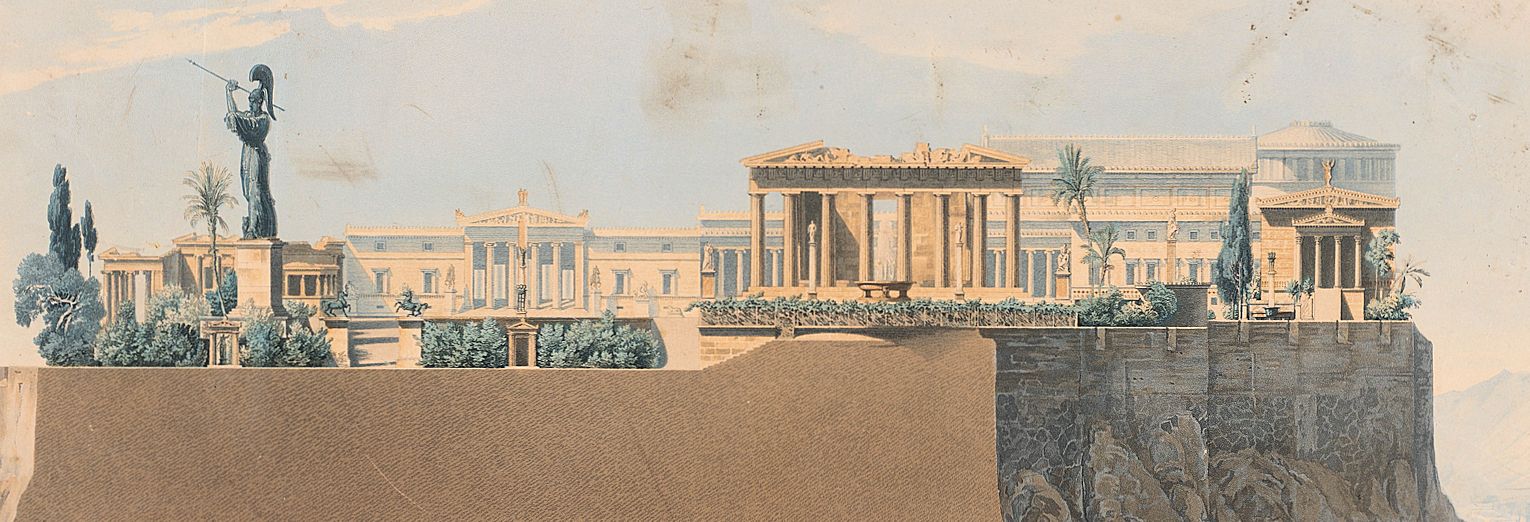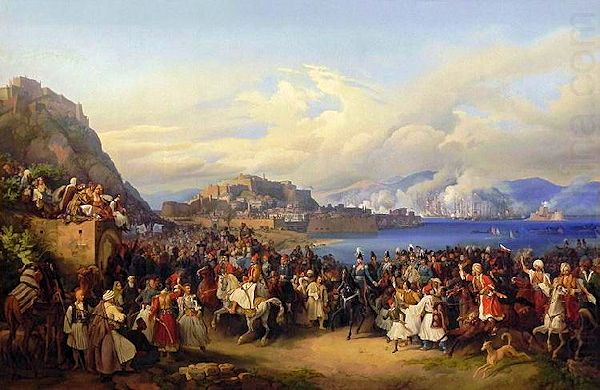schinkel | Palace on the Acropolis Athens 1834 |
|
Karl Friedrich Schinkel's Project for a Royal Palace on the Acropolis
|
On 6 February 1833 amid a scene of extraordinary spectacle and celebration the 17-year-old Otto von Wittelsbach disembarked from the English frigate Madagascar and stepped ashore on the coast of Argolis. Anchored in the bay of Nauplia were 25 ships of war and 48 transports all heavily decorated; 3,000 brightly uniformed Bavarian troops already ashore greeted his arrival in Greece. The music of
bands sounded from ship and shore as crowds of jubilant Greeks and Albanians, mountaineers and islanders, soldiers, sailors and merchants cane to welcome the young foreigner whom their National Assembly had declared "Basileus" and, citing Agamemnon as precedent, "King of the Greeks." To the wildly enthusiastic crowd it seemed as if a new Greece were being born and many of those present recalled the glories of the Greece of Homer and Thucydides as well as the more recent Byzantine ideal of an Orthodox Christian
occurnene that had sustained them throughout their recently concluded war of independence against the Ottoman Empire.1
|
|
Russia, Great Britain, France, and to a lesser degree Austria, had all become involved during the 1820s in the Greek War of Independence that was virtually indistinguishable from a civil war among rival Greek factions. For four years, one man had attempted to govern and unify the emerging nation. Count John Capodistrias (his ancestors on Corfu had received a patent of nobility from the Venetian Republic) had been elected president by the National Assembly of Troezene on 14 April 1827 for a period of seven
years.2 The European powers, however, felt that only a disinterested outsider could rule impartially, and--as a protocol of February 1830 barred members of the reigning families of the Protecting Powers (i.e., France, Great Britain, and Russia) from the Greek throne--the sovereignty was offered to Prince Leopold of Saxe-Coburg (later King Leopold of the Belgians). After first accepting, Leopold was persuaded by Capodistrias to resign on the grounds that his Greek subjects would never tolerate the constricting
frontiers the Protecting Powers were then discussing.3 But on 9 Ocrober 1831 Capodistrias was assassinated and by 1832 almost everyone agreed to the candidacy of Otto von Wittelsbach. This son of King Ludwig of Bavaria had been considered even before Leopold of Saxe-Coburg but rejected as too young and inexperienced to cope with economic and political anarchy. Now the crown was offered to the 17-year-old Otto who should reign under a Bavarian regency until 1835 when he reached majority. The Sultan recognized
the Kingdom of Greece in the Treaty of Constantinople signed in July 1832 and in August the National Assembly ratified the election of King Otto. The Protecting Powers provided the King's government with a loan of 60 million francs out of which was to be paid an indemnity to Turkey and the cost of the 3,500 troops which the King of Bavaria agreed to send to support his son's throne.4
|
Quondam © 2017.01.09 |

